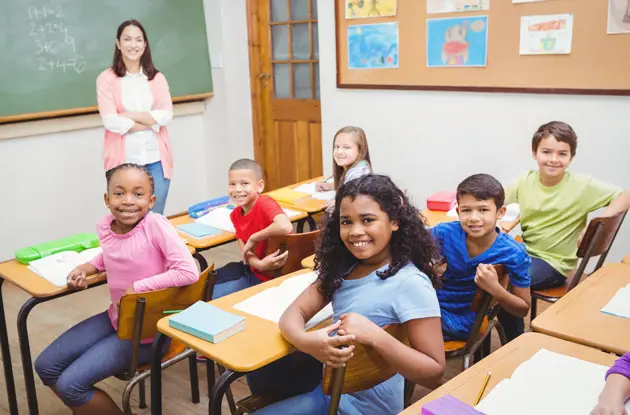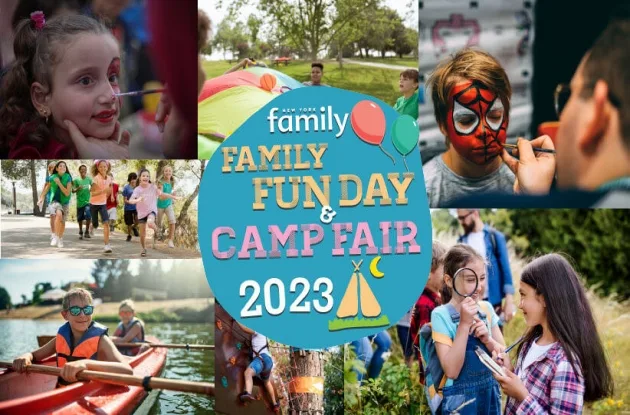Sending your children to camp during the summer months does more than keep them busy. Camp—whether a day camp, sleepaway camp, or specialty camp—can teach kids new skills at camp, such as swimming, archery, photography, dance, and more. But camp can also teach kids life skills that will benefit them during the school year—and beyond.
At my sleepaway camp, Maryanne was the camp cook. From the time I was 10, she and her husband called me ‘the camper’. The nickname stuck, and it still exists at reunions and on social media messages decades later. Although I never mentioned that tidbit to my high school students (I used to be a teacher), I learned at an early age that relationships matter. Forming bonds matters. And no matter who you are, where you come from, or what position you hold (at camp, in school, or at work), interacting with people allows us to learn lessons we never knew would make such a difference in our lives.
There are lessons in everything. Some of the most important ones take shape in our youth while we’re at camp, such as learning to clean up the cabin, clear the dishes, and help out a fellow camper. These, along with other camp lessons—be an active listener, pay attention to the little things, and be excited to learn new things—influence us well beyond the camp cabins. Sometimes it’s hard for parents to send their little ones away to camp for the day, the week, the month, or the entire summer. But when they do, it’s clear that these lessons learned in the summer months will last far into kids’ adult years—and more immediately help them in the classroom. Here’s a look at some camp wisdom that can also help kids be better students:
Do unto others.
Campers and counselors share hopes, dreams, fears, challenges, struggles, wishes for the future, and much more. We all bring a different level of baggage and gifts to the table, and all of us deserve to be treated with kindness, respect, empathy, and compassion. Camp opens minds, breaks boundaries, and enriches souls. As an educator, I taught my ninth-graders about religions and philosophies and how although each has its differences, most have something similar to the Golden Rule: Treat others as you would like to be treated. I learned that lesson at camp far before I ever set foot in a global history classroom, and my students practiced it regularly. Sometimes it meant sharing snacks with one another. Sometimes it meant stepping in when a fellow student was bullied. Sometimes it meant saying hello to a staffer who treated them with kindness. Without question, there is no expiration date on kindness and treating others with respect.
Find your creativity.
My first class at sleepaway camp was painting on rocks. Perhaps that’s not a skill I use on a daily basis, but the message behind it? Definitely. Feel the feelings, listen to your heart, create what speaks to you, and, even if you think it won’t be understood, don’t be afraid to show the world your idea or creation. Students benefit from this on a daily basis. Taking up a musical instrument when their friends’ choices are different, trying out for a school play, expressing oneself through writing, or jumping into graphic design classes are only some of the ways that creativity shines in school settings. These lessons apply in education, in the arts, in job performance, in hobbies, and in life.
Rest assured that there’s something for everyone.
I have three best friends from sleepaway camp. One loved horseback riding, one adored farming, one was a fan of arts and crafts; three of us became lifeguards; and all of us became counselors. Later in life, three of us became educators and two of us took to the creative arts. Theater arts, community service, music, sports, and internships are only some of the many avenues out there, and whether we are young or young-at-heart, there is always a place for all of us.
Practice patience, positivity, persistence, and perseverance.
These four words embody the characteristics of many of my favorite counselors, and I passed those lessons and skills on to campers when I became a counselor. Sometimes kids were homesick and a positive attitude boosted their spirits. Sometimes kids were frustrated when they tried something new, and persistence and perseverance were the lessons of the day. And sometimes some kids took longer at learning, accepting, or changing, and patience was more important than our counselors ever knew. Every day in the classroom, students put these lessons into action. They try harder at math, work diligently at acquiring a second language, and use mindfulness techniques to bring their positivity to light. We may outgrow the ability to be campers, but we never outgrow the need for these significant lessons—especially in a learning environment.
Learn new things.
I rode my first horse, became a lifeguard, and learned how to make a one-match campfire at camp. Each of these was fairly terrifying, yet today I continue to use all of these skills (well, most of them). The desire to learn things doesn’t end when the buses leave camp on the last day. From the first day of school onward, learning things is part of a student’s existence; perhaps it’s a new scientific equation, a new culinary technique, a new sport in physical education, or a new way of interpreting a classic novel. Learning new things keeps our minds open and our perspective broadening. Whether traditional schooling, home schooling, or the learning that comes from being out in the world, the yearning for more knowledge, more culture, more skills, and more growth never fades.
Try new things, especially if they make you uncomfortable.
There was a giant rock called Geronimo on the shoreline at camp. I always thought those who climbed it and jumped off were exceptionally brave. I was petrified to try this myself, yet somehow when I wiped the foamy sea from my face and came up for air, I felt exhilarated. The idea of being afraid, taking a deep breath, and doing it anyway applies to core classes in school and far beyond. Walking into a new high school, not having any friends in your lunch period, or deciding to join the Robotics Club when everyone else is going to chorus—every day at school there’s a bit of discomfort, but applying this lesson from camp creates ease, lessens stress, and empowers youth. Later in life, my best friends from camp and I lived in other parts of the world, grew gardens, raised children, started businesses, got married, and even made new friends. Each of these things involved stepping beyond our comfort zone, yet even the bumps and bruises along the way have been incredibly worthwhile. George Addair is right: “Everything you’ve ever wanted is on the other side of fear.”
Show empathy.
At every camp I went to and worked at, at some point in the day, there was swimming of some kind—whether it meant walking down more than 200 steps to the beach or leaving the locker room, getting a buddy, and heading to the pool. The exercise it provided was good for both mind and body, but the empathy learned through swimming sessions delved deeper. Learning to swim is scary. For some campers, it’s their first time seeing open water. Some have had a traumatic experience in the water and must overcome something far more challenging than stepping their toes over the many unsteady rocks. Some take longer to learn one portion of a stroke before moving on to the next. The instructors taught all of us with ease, kindness, patience, and most importantly empathy. Throughout the school year, students put into action those life lessons: listening to understand each other, utilizing each others’ strengths, lending a hand with each others’ weaknesses, and being aware of various needs and abilities.
Diversity matters.
There were approximately 10 campers per cabin, five cabins per unit, and nearly 15 cabins that formed all of upper girls camp at my summer camp. If an outsider took a straw poll, the diversity levels would have rated off the charts. The differences made us stronger, taught us tolerance, built community, empowered empathy, encouraged perspective, raised our awareness of others’ journeys, and made us better people. School is much the same; there are as many differences as there are students in a school, from backgrounds and traditions, to interests and hobbies, to family units and dreams for life after school. Seeing these differences as vital, enriching, and encouraging creates safe spaces, enables growth, and opens minds. A classroom has 30 different students with 30 different stories. Each peer has merit, value, and purpose. Camp teaches us to embrace them all.
Sharing is caring.
Everyone is a teacher at camp. Debbie inspired me to be a lifeguard. Katie shared her love of travel, inspiring me to go off on my own adventures. Millie taught me to cook. Krista taught me to swim and shared her snacks. Each of them, along with many others, shared their wisdom. Each camper and counselor has something to offer, creating a sense of community that in turn benefits students and schools. Campers, and later students, learn that school is a safe space where adults share wisdom and advice and guidance comes in many forms. Some students learn best from a teacher, others confide in their coaches and advisors, some chat with the nurse, cafeteria workers, librarians, or the many others who are a part of the school setting. Students become better friends, better learners, and are more willing to put their talents out there in the world. Compassion, knowledge, and talents are shared at lunch tables, in after-school activities, and in the classroom. It truly does take a village, and embracing that mindset creates a culture of community-minded youth.
Be proud of your achievements.
As a sleepaway camper, I couldn’t wait for Sunday night’s council fire. That was when the entire girls camp got together and sang songs, and one cabin was awarded Honor Cabin. People got their swim certificates, and the whole camp celebrated newly appointed lifeguards. As an aquatics director at a day camp, I gave out swimmer of the week certificates to various campers. As a student, it feels good to have your work honored, your creations displayed, and your efforts encouraged. Success isn’t built overnight and learning to take pride in your achievements begins at camp and continues into school—and later into adulthood. At camp I learned from an early age to strive for goals, be proud of achievements, and continue reaching for the next, often seemingly unattainable, goal.
My camp brochure had pictures of open water, cool cabins, enticing evening activities, animals and arts, fields and farming; it looked as if you could jump directly into all of the fun. The pictures couldn’t possibly quantify the learning that happened, all of the skills acquired, the positive experiences, or the personal growth that took place. Ask any former camper what they remember and you’ll get stories of escapades with friends, cool counselors, awesome activities, and endless fun. Ask them what they learned at camp and be prepared to settle in for an infinite list of hard skills, soft skills, and life lessons that helped turn them into the person standing in front of you today. Camp lessons aren’t scored on a rubric or a bubble sheet, on a multiple-choice assessment or in a three-page essay. These lessons stand the test of time, open minds, build bridges, impart skills and wisdom, and create communities of happy, kind, fulfilled humans. It’s hard to imagine a better score than that.



















